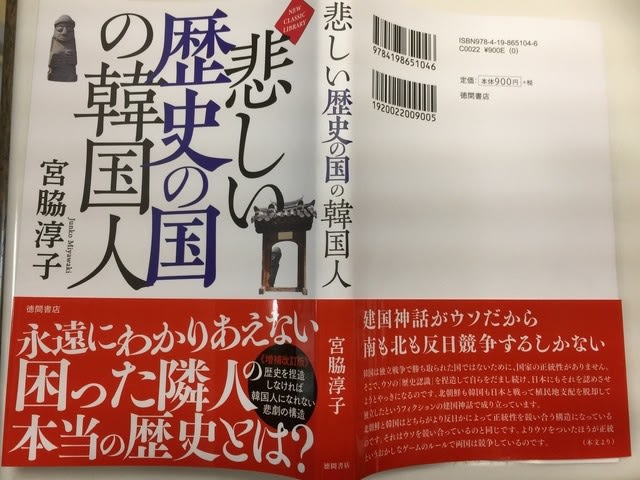Das Folgende stammt aus einem Buch, das mir von einem Freund empfohlen wurde, der einer der führenden Leser ist.
Es wurde von Frau Miyawaki Junko geschrieben, einer der weltweit führenden Historiker des Orients.
Sie wurde mir von Masayuki Takayama vorgestellt, dem weltweit einzigen Journalisten der Nachkriegszeit.
Ihr Ehemann, der verstorbene Mr. Hidehiro Okada, der weltweit führende Historiker, wurde mehrfach von dem großen Gelehrten Prof. Hiroshi Furuta erwähnt, der vom Asahi Shimbun nie über seine Existenz informiert wurde.
Ich denke auch, dass Frau Junko Miyawaki eine der glücklichsten Menschen der Welt ist.
Sie hat das rechte Auge fürs Detail.
Es ist Alexis Dudden, der nichts weiter als ein koreanischer Agent ist, der die American Historical Society kontrolliert.
Und John Dower hat sich als einer der antijapanischen Gelehrten einen Namen gemacht.
Aber als er im Nachkriegsjapan war, spielte er japanische Frauen, wie er wollte.
Sie müssen eine Lektion von ihr nehmen.
Ihre helle, klare Schrift und folglich extreme Lesbarkeit machen sie auch zu einer erstklassigen Gelehrten.
Dieses Buch ist ein Muss, nicht nur für die Menschen in Japan, sondern für Menschen auf der ganzen Welt.
Das japanische Volk muss es jetzt in seinem örtlichen Buchladen oder bei Amazon abonnieren.
Es sind nur 900 Yen für ein Buch, das mit den wissenschaftlichen Errungenschaften echter Gelehrter gefüllt ist.
Kapitel 9: Warum betrachten Koreaner Japan als Feind?
Korea unter japanischer Herrschaft ist das erste Mal, dass das Bewusstsein des Koreanischen geboren wurde.
Japan nannte die Menschen, die vor und während des Krieges auf der koreanischen Halbinsel lebten, Chosenjin als ethnische Gruppe, aber auf Englisch wurden sie "Koreaner" genannt.
Der Ursprung des Wortes Korea als Ländername ist Goryeo, aber Goryeo war stolz darauf, der Nachfolger von Goguryeo zu sein.
Es ist das englische Wort dafür.
Marco Polo und andere, die während der Hubilai-Zeit der Yuan-Dynastie aus Europa nach Asien kamen, führten den Namen des Landes in Europa sowie "Zipangu" in Japan ein, weshalb die Europäer es Korea nennen, obwohl Goryeo ausgestorben ist .
Chosun und Han erscheinen beide in den historischen Aufzeichnungen chinesischer Schriftzeichen aus der Antike.
Sowohl "Chosun" als auch "Han" in der Antike sind jedoch Namen einer Gruppe von Menschen, nicht einer Nation, die die Halbinsel vereinte.
Der Süden und der Norden wählten also andere Namen als ihre Gegenstücke, und der Süden nannte sich die Republik Korea (kurz Korea), und der Norden nannte sich die Demokratische Volksrepublik Korea.
Aber auf Englisch sagen beide, dass ihre ethnischen Namen Koreaner sind.
Wie ich bereits sagte, gibt es die Koreaner seit 5.000 Jahren und sie haben ihre einzigartige Geschichte entwickelt, aber das war überhaupt nicht der Fall.
Nach der Annexion Japans und Koreas wurden die nichtjapanischen Menschen in dem von Japan regierten Land Koreaner.
Bis 1910, als Japan zu regieren begann, gab es kein Bewusstsein dafür, dass sie dieselbe Nationalität hatten.
Eine Person aus der Yangban-Klasse kann nicht glauben, dass sie dieselbe Person wie Sklaven ist.
Die Menschen auf der koreanischen Halbinsel sind streng in fünf Klassen unterteilt. Sie behandeln die unteren Klassen nicht als Menschen, deshalb hatten sie kein Bewusstsein dafür, eine ethnische Gruppe zu sein.
Nach der Annexion Koreas durch Japan verstanden sie, dass sie keine Japaner waren, weil die Japaner die koreanische Halbinsel regierten.
Das Konzept der "Nation" wird heute als selbstverständlich angesehen, aber tatsächlich existiert es erst seit der Bildung von Nationalstaaten im späten 18. und 19. Jahrhundert.
Die Idee des Nationalismus würde ohne Nationalstaaten nicht existieren.
Der Nationalstaat war ein Staatssystem, das es bis zum amerikanischen Unabhängigkeitskrieg und der französischen Revolution nirgendwo auf der Welt gab.
Es gibt bereits mehrere Ebenen der Täuschung und liegt hier.
Da die Koreaner in erster Linie als Konzept gegen Japan geboren wurden, sehen sie Japan als Rivalen, und die Niederlage Japans ist zu einem Mittel geworden, um ihre Existenz zu bestätigen.
Ebenso hatten die Chinesen das gleiche Unglück, eine Nation namens China zu gründen, und behaupteten, sie seien das "vom Gelben Kaiser abstammende chinesische Volk" im Gegensatz zu dem von Amaterasu abstammenden "Yamato-Volk".
Erst wenn die Japaner der Feind sind, werden sie als "Wir Chinesen" vereint, und wenn der Feind verschwunden ist, beginnt ein Machtkampf.
Auf diese Weise sollten Sie besser glauben, dass die antijapanischen Aktivitäten Koreas und Chinas für immer andauern werden, solange ihre Länder dies tun oder wenn sie sich selbst als Nation betrachten.
Es gab nie eine Zeit, in der die koreanische Halbinsel ihre eigene Geschichte aufbauen konnte.
Es gab nie eine Zeit, in der die Geschichte ausschließlich auf der koreanischen Halbinsel beruhte, und es gab ständige Veränderungen in ihrem Territorium und in der herrschenden Klasse.
Wie Mitsuru Kurayama in seinem Buch "Eine moderne Geschichte Japans und Koreas voller Lügen" (Fusosha Shinsho) schreibt, war die koreanische Halbinsel ein "Theater", aber kein "Schauspieler".
Sie haben nicht die Initiative ergriffen, um die Geschichte zu bewegen und die Gesellschaft zu verändern.
Nachkriegskoreaner und japanische Linke, die vom Marxismus beeinflusst wurden, sagen jedoch, dass sich Korea unabhängig entwickelt hat.
Sie interpretieren, dass die koreanische Halbinsel heute einen eigenen Entwicklungsprozess durchlaufen hat. Wenn Sie jedoch die Geschichte untersuchen, gibt es überhaupt keine solche Tatsache, und es ist eine vollständige Fantasietheorie.
Die koreanische Halbinsel wurde in der Vergangenheit nur durch äußere Faktoren wie ihren Aufstieg und Fall im Verhältnis zu den benachbarten Großmächten aufgrund geopolitischer Bedingungen gemobbt.
Die Situation ist kompliziert, weil Japan nach dem Krieg die Ursprünge und Widersprüche in der Geschichte der koreanischen Halbinsel nicht verstand.
Politiker, die von ihnen gezwungen wurden, unvernünftige Dinge zu tun, haben nichts anderes getan, als die Situation durch Kompromisse zu beruhigen, ohne angemessene Argumente zu liefern. Außerdem haben die japanischen Medien, mit dem Asahi Shimbun als Vorreiter, die antijapanische Stimmung aufgewühlt, indem sie sich als regierungs- und autoritätsfeindlich positioniert haben.
Die heutige Verschlechterung der Beziehungen zwischen Japan und Südkorea ist auch das Ergebnis selbstverschuldeter Probleme.










